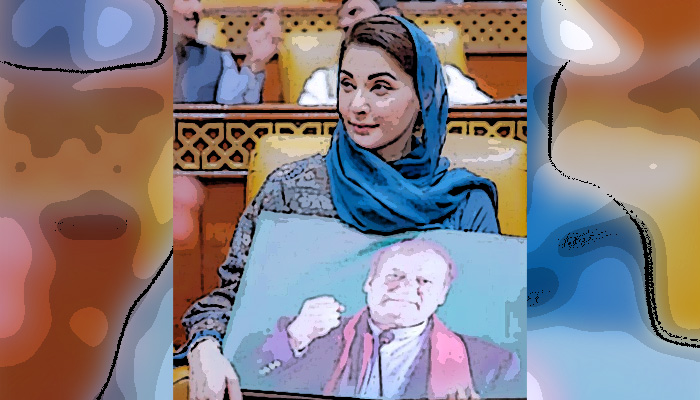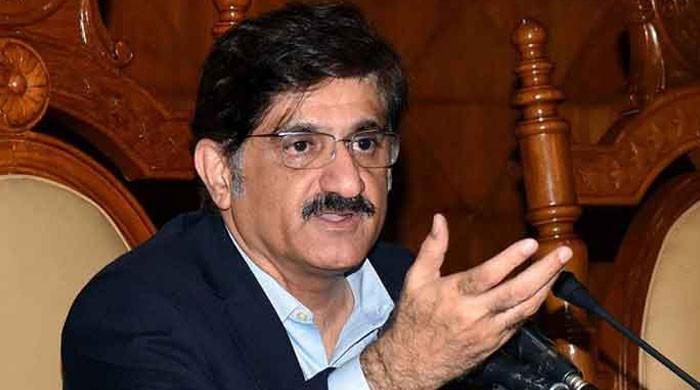Maryam Nawaz goes down in history as first woman CM of Punjab
Her governance will have impacts reaching far beyond provincial demarcations, playing a phenomenal role in chalking out PML-N's political trajectory down the line
February 26, 2024

In a watershed for women empowerment in the largely male-dominant politics of Pakistan, Maryam Nawaz, senior vice president of Pakistan Muslim League-Nawaz (PML-N) and heir-apparent to party supremo Nawaz Sharif, went head-on through the gender and non-gender barriers to clinch the prestigious office of the Punjab chief minister.
Maryam's accomplishment marks a path-breaking and historical moment, as she becomes the first woman to rise to the highest office of Pakistan's most populated province in Pakistan history spanning more than 75 years.
The political scion will now assume the coveted seat after winning the elections by receiving the backing of 220 members of the provincial assembly. Interestingly her election to CM was marred by a boycott by the Opposition comprising the Sunni Ittehad Council (SIC).
Holding the positions of senior vice president and chief organiser of the party, the 50-year-old plays a significant role in setting the PML-N's future direction.
Maryam debuted in parliamentary politics last Friday (February 23) when she was sworn in as a member of the Punjab Assembly, the legislature which previously elected her father and uncle, Shehbaz Sharif, as chief ministers.
Before embarking on her political career, the newly-elected chief minister led her family's philanthropic ventures. She was the chairperson of the Sharif Trust, Sharif Medical City and Sharif Education Institutes.
In 2012, Maryam formally entered the political arena, taking on the responsibility of overseeing the PML-N's election campaign leading up to the 2013 general elections. The party emerged victorious and her father became the country’s prime minister for the third time — but his five-year stint was cut short when he was disqualified in 2017.
Following the elections, she took the helm of the Prime Minister's Youth Programme as its chairperson. However, her tenure was short-lived. Maryam resigned from that position in 2014.
This decision came amidst mounting criticism from Pakistan Tehreek-e-Insaf (PTI) founder Imran Khan, who raised questions about nepotism and a local party leader also challenged the validity of her university degree in the Lahore High Court.
The year 2017 marked a turning point in Maryam’s political career. Following her father's disqualification and subsequent conviction on corruption charges tied to the Panama Papers, she stepped into the public arena.
During the by-elections for her father's vacated Lahore seat (NA-120), she actively campaigned for her mother, Kulsoom Nawaz.
But just like every other politician rising the ranks, Maryam, in 2018, faced legal challenges that cast a shadow on her political career.
Days before the 2018 general polls in July, an accountability court handed her a seven-year sentence in the Avenfield corruption reference case — about the purchase of properties in London. Nawaz also received 10 years in jail in the same case.
This conviction was a major setback for Nawaz’s daughter as it rendered her ineligible to run in the nationwide elections.
She was later arrested in several other cases; however, after coming out on bail in 2019, she actively participated in politics as her father had begun his four-year self-imposed exile in London, where he had gone to receive “medical treatment”. This was the same year the party appointed her vice president.
In September 2022, the Islamabad High Court overturned her as well as her husband Captain (retd) Muhammad Safdar’s corruption conviction, allowing her to contest the 2024 general elections.
Fast forward to January 2023, the PML-N appointed her as the senior vice president as well as the chief organiser — this did not seemingly sit well with veteran leaders, especially Shahid Khaqan Abbasi, one of the party's stalwarts, who openly disputed her ascendance to the position.
Maryam, who is among the senior leaders of the PML-N, holds Punjab’s top office which is a post that will be responsible for more than half of Pakistan’s population.
Now the mighty onus of filling her father and uncle’s big shoes in terms of “good governance” lies with her amid calls that she lacks Nawaz's administrative experience and Shehbaz's blend of efficiency and charisma.
Maryam's leadership, now under the microscope, will be on trial until she outperforms her predecessors. The prosperity of Punjab and her party’s ability to regain its lost electoral glory in its own backyard is tied to her political shrewdness and administrative acumen.
Her governance will have impacts reaching far beyond the provincial demarcations, playing a phenomenal role in chalking out the party’s political trajectory down the line.











